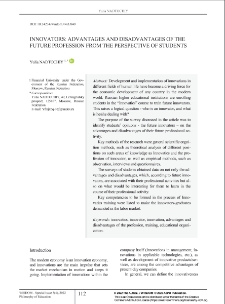Object
Title: Innovators: Advantages and Disadvantages of the Future Profession from the Perspective of Students
Ամսագրի կամ հրապարակման վերնագիր:
Հրապարակման ամսաթիվ:
Հատոր:
Համար:
ISSN:
Համատեղ հեղինակները:
Խ․ Աբովյանի անվան հայկական պետական մանկավարժական համալսարան
Ծածկույթ:
Ամփոփում:
Development and implementation of innovations in different fields of human life have become a driving force forthe economic development of any country in the modern world. Russian higher educational institutions are enrolling students in the “Innovatics” course to train future innovators. This raises a logical question - who is an innovator, and what is he/she dealing with?The purpose of the survey discussed in the article was to identify students‟ opinions - the future innovators – on the advantages and disadvantages of their future professional activity. Key methods of the research were general scientific cognition methods, such as theoretical analysis of different positions on such areas of knowledge as Innovatics and the profession of innovator, as well as empirical methods, such as observation, interviews and questionnaires.The surveys of students obtained data on not only the advantages and disadvantages, which, according to future innovators, are associated with their professional activities but also on what would be interesting for them to learn in the course of their professional activity.Key competencies to be formed in the process of Innovatics training were listed to make the innovators-graduates demanded in the labor market.
Հրատարակության վայրը:
Երևան
Հրատարակիչ:
Ձևաչափ:
Նույնացուցիչ:
oai:arar.sci.am:372206
Լեզու:
Object collections:
Last modified:
Oct 8, 2025
In our library since:
Apr 3, 2024
Number of object content hits:
63
All available object's versions:
https://arar.sci.am/publication/402141
Show description in RDF format:
Show description in OAI-PMH format:
-
Իմաստություն=Wisdom=Мудрость
-
Իմաստություն, 2013, N 1
-
Իմաստություն, 2014, N 1 (2)
-
Իմաստություն, 2014, N 2 (3)
-
Իմաստություն, 2015, N 1 (4)
-
Wisdom, 2015, N 2 (5)
-
Wisdom, 2016, N 1 (6)
-
Wisdom, 2016, N 2 (7)
-
Wisdom, 2017, N 1 (8)
-
Wisdom, 2017, N 2 (9)
-
Wisdom, 2018, N 1 (10)
-
Wisdom, 2018, N 2 (11)
-
Wisdom, 2019, N 1 (12)
-
Wisdom, 2019, N 2 (13)
-
Wisdom, 2020, N 1 (14)
-
Wisdom, 2020, N 2 (15)
-
Wisdom, 2020, N 3 (16)
-
Wisdom, 2021, N 1 (17)
-
Wisdom, 2021, N 1 (1) Special issue
-
Wisdom, 2021, N 2 (18)
-
Wisdom, 2021, N 3 (19)
-
Wisdom, 2021, N 4 (20)
-
Wisdom, 2022, N 1 (21)
-
Wisdom, 2022, N 1 (2) Special issue
-
Wisdom, 2022, N 2 (22)
-
Wisdom, 2022, N 2 (3) Special issue
-
Wisdom, 2022, N 3 (23)
-
Wisdom, 2022, N 3 (4) Special issue
- Editorial board
- Contents
- Editor`s Foreword
- Cultural Studies’ Approach as a Methodological Basis of Modern Pedagogical Education
- Digital Transformation of Education in the Context of Informatization of Education and Society Against the Background of Russian Armed Aggression: Current Problems and Vectors of Development
- Progressive Education: Views from John Dewey’s Education Philosophy
- Conceptual Model of a Smart Integrated Educational Environment
- The Philosophy of Education and Upbringing as the Quintessence of Women's Emancipation
- Social and Pedagogical Factors of Management in the Educational Space
- Orientation Strategies at Apparatgeist Era: Distributed Cognition and Romantic Ideals of Education
- Development of Digital Storytelling Based on Local Wisdom
- Philosophy of Education and Science in the Context of Digitalization of Society
- The Relationship of the Philosophy of Education and the History of Philosophy: A Forecast of Educational Trends 2022-2024
- Philosophy of Legal Education and Training in the Context of the Information Age
- Pancasila as a Philosophical Basis of Religious Education in the Context of Indonesian Religious Diversity
- Innovators: Advantages and Disadvantages of the Future Profession from the Perspective of Students
- Investigation of the Efficiency of Distance Learning in the Conditions of the Pandemic
- Philosophy and Education as Cultural Phenomena
- Moral and Justice as the Philosophical Basis of Legal Education: A Criticism of the Indonesian Ministry of Education's “Merdeka Belajar” and “Kampus Merdeka” Concepts
- Digital Transformation of Education and Humanization of Relationships in the Educational Environment: Some Aspects of Relationship and Mutual Influence
- Personal Development as a Key Criterion for Higher Education Quality
- Pedagogical Aspects of the Protection of Human Rights in the Context of the Philosophy of Education and Law
- Digitalization of Russian Higher Education: Difficulties of the Transition Period
- The Education Philosophy of Confucius and Its Implications for the Philosophical Innovation of Education in Vietnam Nowadays
- Notes to Contributors
-
Wisdom, 2022, N 4 (24)
-
Wisdom, 2023, N 1 (25)
-
Wisdom, 2023, N 2 (26)
-
Wisdom, 2023, N 3 (27)
-
Wisdom, 2023, N 4 (28)
-
Wisdom, 2024, N 1 (29)
-
Wisdom, 2024, N 2 (30)
-
Իմաստություն, 2013, N 1
| Edition name | Date |
|---|---|
| Nadtochiy, Yulia, Innovators: Advantages and Disadvantages of the Future Profession from the Perspective of Students | Oct 8, 2025 |





